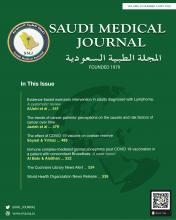Research ArticleOriginal Article
Open Access
Effects of health literacy on type 2 diabetic patients’ glycemic control, self-management, and quality of life
Bushra A. ALSharit and Eman A. Alhalal
Saudi Medical Journal May 2022, 43 (5) 465-472; DOI: https://doi.org/10.15537/smj.2022.43.5.20210917
Bushra A. ALSharit
From the Department of Community and Mental Health Nursing, Nursing Collage, King Saud University, Riyadh, Kingdom of Saudi Arabia.
RNEman A. Alhalal
From the Department of Community and Mental Health Nursing, Nursing Collage, King Saud University, Riyadh, Kingdom of Saudi Arabia.
PhD.
References
- 1.↵
- Nutbeam D.
- 2.↵
- 3.↵
- Coughlin SS,
- Stewart JL,
- Young L,
- Heboyan V,
- De Leo G.
- 4.↵
- 5.
- 6.↵
- Pleasant A,
- O’Leary C,
- Carmona R.
- 7.↵International Diabetes Federation. IDF diabetes atlas 2021: 10th edition. [Updated 2021; 2021 Nov 2]. Available from: https://diabetesatlas.org/idfawp/resource-files/2021/07/IDF_Atlas_10th_Edition_2021.pdf
- 8.↵World Health Organization. Global report on diabetes. [Updated 2016; 2021 Sep 20]. Available from: https://www.who.int/publications/i/item/9789241565257
- 9.↵
- 10.↵
- 11.↵
- 12.↵
- Estrella ML,
- Allen-Meares P.
- 13.↵American Diabetes Association. 15. Diabetes advocacy: standards of medical care in diabetes-2018. Diabetes Care 2018; 41: S152–S153.
- 14.↵
- Paasche-Orlow MK,
- Wolf MS.
- 15.↵
- 16.↵
- Lee EH,
- Lee YW,
- Moon SH.
- 17.↵
- Poureslami I,
- Nimmon L,
- Rootman I,
- Fitzgerald MJ.
- 18.↵
- 19.↵
- Dahal PK,
- Hosseinzadeh H.
- 20.↵
- Schillinger D,
- Grumbach K,
- Piette J,
- Wang F,
- Osmond D,
- Daher C, et al.
- 21.↵
- Souza JG,
- Apolinario D,
- Magaldi RM,
- Busse AL,
- Campora F,
- Jacob-Filho W.
- 22.↵
- Cavanaugh K,
- Huizinga MM,
- Wallston KA,
- Gebretsadik T,
- Shintani A,
- Davis D, et al.
- 23.↵
- 24.↵
- Bujang MA,
- Mohan K,
- Mohd Hatta NKB,
- Baharum N,
- Ismail M.
- 25.
- Hsu HC,
- Lee YJ,
- Wang RH.
- 26.↵
- 27.↵
- Kiadaliri AA,
- Najafi B,
- Mirmalek-Sani M.
- 28.↵
- Gaffari-Fam S,
- Lotfi Y,
- Daemi A,
- Babazadeh T,
- Sarbazi E,
- Dargahi-Abbasabad G, et al.
- 29.↵
- Al Sayah F,
- Majumdar SR,
- Johnson JA.
- 30.↵
- 31.↵
- Smith SK,
- Nutbeam D,
- McCaffery KJ.
- 32.↵
- Almigbal TH,
- Almutairi KM,
- Vinluan JM,
- Batais MA,
- Alodhayani A,
- Alonazi WB, et al.
- 33.↵
- Mashi AH,
- Aleid D,
- Almutairi S,
- Khattab F,
- AlMuqawed AN,
- Khan S, et al.
- 34.↵
- Kline RB.
- 35.↵
- Haun J,
- Noland-Dodd V,
- Varnes J,
- Graham-Pole J,
- Rienzo B,
- Donaldson P.
- 36.↵
- Rague JT,
- Kim S,
- Hirsch JA,
- Meyer T,
- Rosoklija I,
- Larson JE, et al.
- 37.↵
- Theiss LM,
- Wood T,
- McLeod MC,
- Shao C,
- Santos Marques ID,
- Bajpai S, et al.
- 38.↵
- 39.↵
- Toobert D,
- Glasgow R.
- 40.↵
- 41.↵
- Ansari RM,
- Harris MF,
- Hosseinzadeh H,
- Zwar N.
- 42.↵
- 43.↵The World Health Organization quality of life assessment (WHOQOL): development and general psychometric properties. Soc Sci Med 1998; 46: 1569–1585.
- 44.↵
- Ohaeri JU,
- Awadalla AW.
- 45.↵
- Whoqol Group
- 46.↵
- 47.
- Duarte SBR,
- Chaveiro N,
- de Freitas AR,
- Barbosa MA,
- Camey S,
- Fleck MP, et al.
- 48.↵
- 49.↵
- Ho TG,
- Hosseinzadeh H,
- Rahman B,
- Sheikh M.
- 50.
- Nassar CM,
- Salameh P.
- 51.
- Hussein SH,
- Almajran A,
- Albatineh AN.
- 52.↵
- 53.↵
- Palumbo R,
- Annarumma C,
- Manna R,
- Musella M,
- Adinolfi P.
- 54.↵
- 55.↵
- Gordon Singh S,
- Aiken J.
- 56.↵
- Brach C,
- Keller D,
- Hernandez LM,
- Baur C,
- Parker R,
- Schyve P, et al.
- 57.↵
- Wills J,
- Sykes S,
- Hardy S,
- Kelly M,
- Moorley C,
- Ocho O.
- 58.↵
- Niknami M,
- Mirbalouchzehi A,
- Zareban I,
- Kalkalinia E,
- Rikhtgarha G,
- Hosseinzadeh H.
- 59.↵
- Omisakin FD,
- Ncama BP. Self
- 60.↵
- 61.
- 62.↵
- Jayasinghe UW,
- Harris MF,
- Parker SM,
- Litt J,
- van Driel M,
- Mazza D, et al.
- 63.↵
- Skevington SM,
- Lotfy M,
- O’Connell KA.
In this issue
Effects of health literacy on type 2 diabetic patients’ glycemic control, self-management, and quality of life
Bushra A. ALSharit, Eman A. Alhalal
Saudi Medical Journal May 2022, 43 (5) 465-472; DOI: 10.15537/smj.2022.43.5.20210917
Jump to section
Related Articles
- No related articles found.





